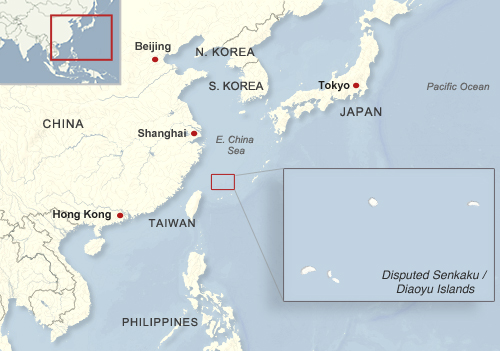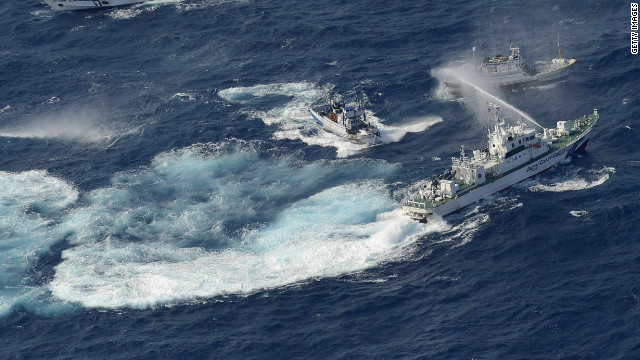(Sorry for the massive lull in blogging- I've kept on coming up with ideas for posts, but never finishing them. This post will hopefully change that trend)
I was stumbling today and came across the latest music video from World Order(which started this whole thought process). If music could save the world, the song "Permanent Revolution" would. Genki Sudo and company go to both China and Korea and in the middle of their robot dancing manage to see the sites, meet key leaders, and end enmity between the three. Pretty awesome of them, huh? I think it's a response to the recent disputes and I like it. It sparked a thought process about how the Senkaku Islands have become the #1 issue between China and Japan at the moment, which is laid out after the jump.
If you keep up with news about Japan, you've probably heard about the recent Senkaku/Diaoyu Islands dispute between China and Japan. I got to research this topic a bit for a class project last spring, so when I saw them come up in the news, I was very interested.
I say recent, but it's been a touchy issue off and on since Japan acquired the 3 islands and surrounding seven square kilometers in the Sino-Japanese war in 1895. China owned them from about the 15th century until it lost them in 1895. Interestingly enough, according to a Japanese scholar, before the 1970s, the Chinese accepted the Senkaku Islands as part of Japan, because they were related to the Japanese Ryukyu Islands.
Furthermore, in the 1970s, the CIA affirmed that Japan owned them and "that any dispute between Japan, China and Taiwan over the islands would not have arisen had it not been for the discovery of potential oil reserves on the nearby continental shelf in the late 1960s." Oil is the key issue here. Both Japan and China are hungry for oil, because their populations need more energy. China needs more energy for its growing population; Japan is very resource-scarce, importing a whopping 84% of its energy requirements from abroad according to the World Nuclear Association.
The past few months, though, it hasn't only been about natural resources, but leveraging national pride in order to gain those resources.
Here's a quick timeline:
July 7th: Noda announced his plan to nationalize the islands, which had been owned by a private family. July 7th was the anniversary of the Marco-Polo Bridge Incident, which started the second Sino-Japanese War in 1937.
On August 15th, 5 Chinese activists swam ashore one of the Senkaku Islands until the Japanese Coast Guard deported them.
August 19th, Japanese nationalists land illegally and are made to leave.
Japan's nationalistic governor of Tokyo amassed funds to purchase of the private islands official on , but the Japanese government outflanked him and purchased them on September 10th.
Here's a good summary of the interim between the 11th and the 19th:

On September 19th, the Chinese government put an advertisement in the New York Times claiming ownership, which sparked a counter-argument in the times by the Consulate General of New York on October 2nd
On September 20th, over 1000 nationalist activists protested the Chinese embassy in Tokyo.
Taiwan got into the mix on September 25th by moving fishing vessels near the islands which were repelled by water cannons from the Japanese Coast Guard.
Most recently "on Thursday, October 4th, in an apparent show of force, a fleet of seven [Chinese] warships sailed between two of the islands of the Okinawan archipelago."
Japan isn't playing it safe either- the governer of Tokyo announced plans today(October 5th) to build a harbor with a lighthouse and radio transmitter.
Anyway, as should be apparent, things are extremely tense right now between China and Japan(and also Taiwan). I still think that neither want to get into a war over it, though both are showing their teeth.
That's where the US comes in. It has to remain cautiously aloof, because China holds most of its debt in government bonds and is its greatest trade partner. On the other, hand the US is responsible for Japan's military defense under the Constitution of Japan and Japan-US Security Treaty. It's remained largely neutral so far, but today(October 5th) deployed 2 carrier ships in a show of force, in effect saying, "China, don't try anything," without changing any of its discourse. Maybe it will stymy a conflict.... From the Yomiuri
A spot of good news today was about a the ASEAN Maritime Forum, which aimed to start talks on Senkaku and other disputed islands that nations have with China. While nothing conclusive came out, at least communication lines are open.
Anyway, I'm going to continue to watch this. I don't want the search for natural resources and national pride to get in the way of peace in the region, but it seems like it just might.
I was stumbling today and came across the latest music video from World Order(which started this whole thought process). If music could save the world, the song "Permanent Revolution" would. Genki Sudo and company go to both China and Korea and in the middle of their robot dancing manage to see the sites, meet key leaders, and end enmity between the three. Pretty awesome of them, huh? I think it's a response to the recent disputes and I like it. It sparked a thought process about how the Senkaku Islands have become the #1 issue between China and Japan at the moment, which is laid out after the jump.
 |
| Map: Voice of America |
I say recent, but it's been a touchy issue off and on since Japan acquired the 3 islands and surrounding seven square kilometers in the Sino-Japanese war in 1895. China owned them from about the 15th century until it lost them in 1895. Interestingly enough, according to a Japanese scholar, before the 1970s, the Chinese accepted the Senkaku Islands as part of Japan, because they were related to the Japanese Ryukyu Islands.
 |
| Asahi Shimbun |
The past few months, though, it hasn't only been about natural resources, but leveraging national pride in order to gain those resources.
Here's a quick timeline:
July 7th: Noda announced his plan to nationalize the islands, which had been owned by a private family. July 7th was the anniversary of the Marco-Polo Bridge Incident, which started the second Sino-Japanese War in 1937.
On August 15th, 5 Chinese activists swam ashore one of the Senkaku Islands until the Japanese Coast Guard deported them.
August 19th, Japanese nationalists land illegally and are made to leave.
Japan's nationalistic governor of Tokyo amassed funds to purchase of the private islands official on , but the Japanese government outflanked him and purchased them on September 10th.
Here's a good summary of the interim between the 11th and the 19th:

On September 19th, the Chinese government put an advertisement in the New York Times claiming ownership, which sparked a counter-argument in the times by the Consulate General of New York on October 2nd
On September 20th, over 1000 nationalist activists protested the Chinese embassy in Tokyo.
Taiwan got into the mix on September 25th by moving fishing vessels near the islands which were repelled by water cannons from the Japanese Coast Guard.
 |
| CNN |
Japan isn't playing it safe either- the governer of Tokyo announced plans today(October 5th) to build a harbor with a lighthouse and radio transmitter.
Anyway, as should be apparent, things are extremely tense right now between China and Japan(and also Taiwan). I still think that neither want to get into a war over it, though both are showing their teeth.
That's where the US comes in. It has to remain cautiously aloof, because China holds most of its debt in government bonds and is its greatest trade partner. On the other, hand the US is responsible for Japan's military defense under the Constitution of Japan and Japan-US Security Treaty. It's remained largely neutral so far, but today(October 5th) deployed 2 carrier ships in a show of force, in effect saying, "China, don't try anything," without changing any of its discourse. Maybe it will stymy a conflict.... From the Yomiuri
A spot of good news today was about a the ASEAN Maritime Forum, which aimed to start talks on Senkaku and other disputed islands that nations have with China. While nothing conclusive came out, at least communication lines are open.
Anyway, I'm going to continue to watch this. I don't want the search for natural resources and national pride to get in the way of peace in the region, but it seems like it just might.
Comments
Post a Comment